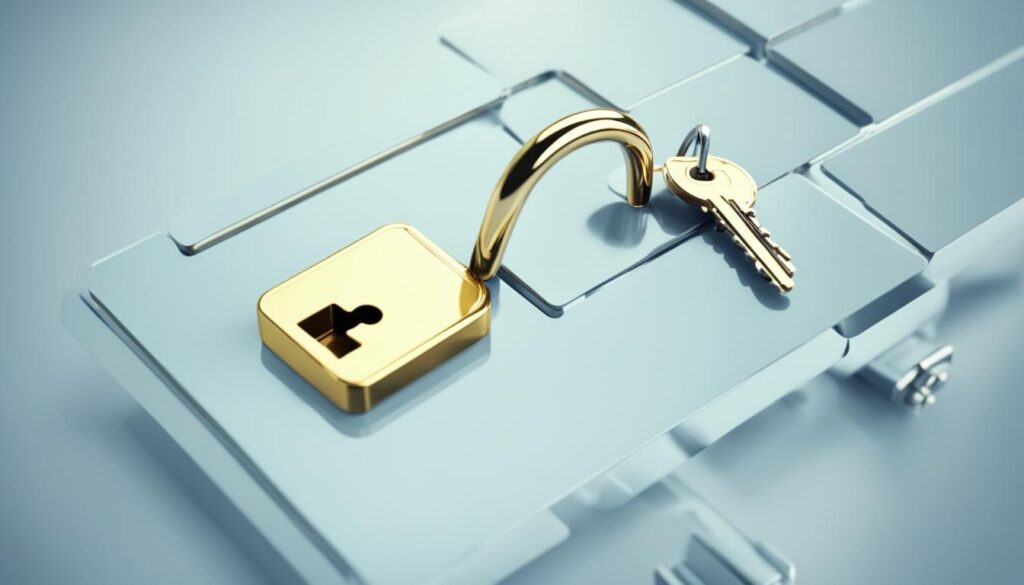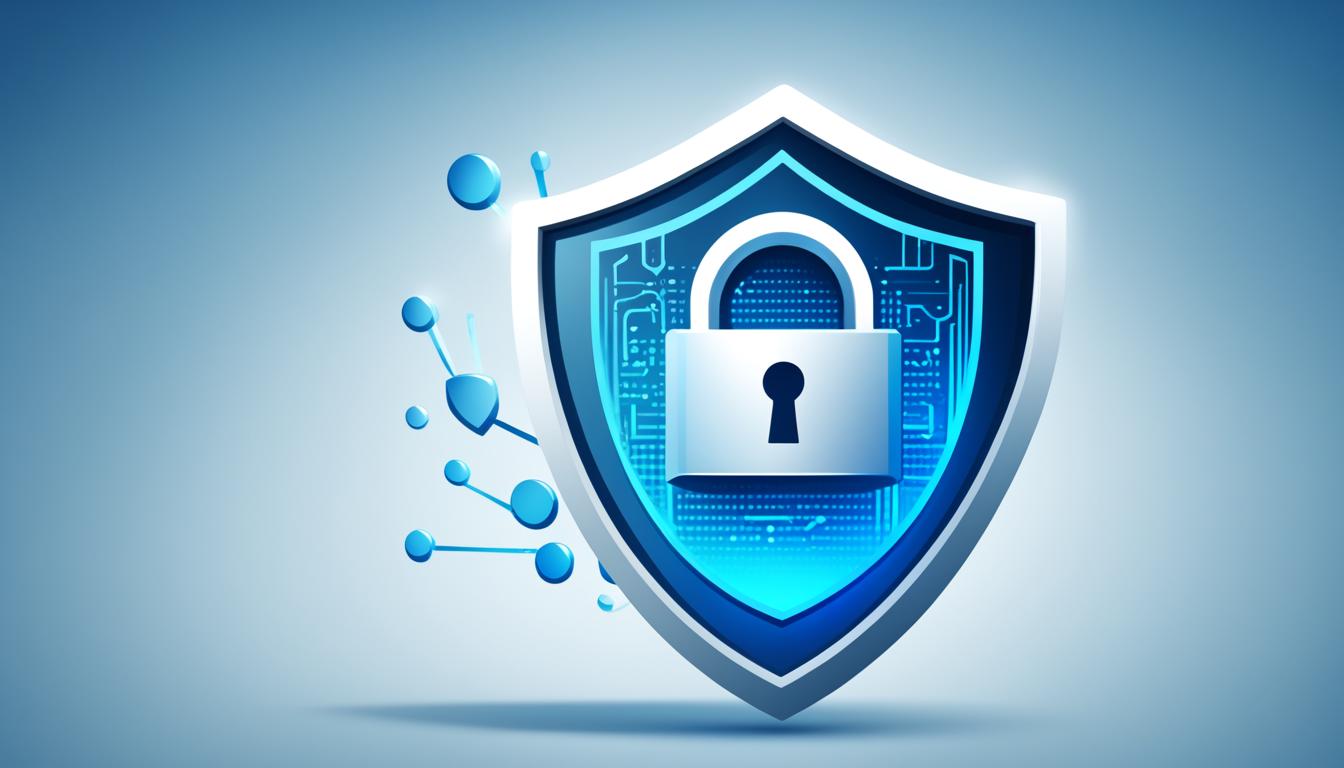Cybersecurity threats are on the rise, and ensuring the security of your website and web applications has never been more crucial. By implementing website security best practices and web application security measures, you can significantly improve cybersecurity and protect valuable data. In this article, we will explore the steps you can take to secure your website and web applications for enhanced cybersecurity.
Key Takeaways:
- Implementing website security best practices and web application security measures are essential for improved cybersecurity.
- Protecting your website from cyber threats is crucial in today’s landscape of increasing cyberattacks.
- SSL implementation is necessary to establish a secure connection between the server and web browser.
- Choosing a secure web hosting provider is vital for ensuring website security.
- Strengthening passwords and enabling two-factor authentication adds an extra layer of security.
The Importance of Website Security
Website owners must prioritize cybersecurity to prevent data breaches and other security incidents. With the increasing number and severity of cyberattacks, implementing steps to protect your website from cyber threats is crucial. By following website security best practices, you can enhance cybersecurity and safeguard sensitive information.
- Regularly Update Your Website: Keep your website’s software, plugins, and themes updated to ensure you have the latest security patches and bug fixes. Outdated software can leave vulnerabilities that hackers can exploit.
- Use Strong and Unique Passwords: Create strong passwords that are unique for each of your accounts. Avoid common passwords and consider using a password manager to securely store and generate strong passwords.
- Implement Two-Factor Authentication (2FA): Enable 2FA to add an extra layer of security to your website. With 2FA, users will need to provide an additional form of verification, such as a text message code or fingerprint scan, along with their password.
- Regularly Backup Your Website: Create regular backups of your website to ensure you can recover your data in case of a security incident or technical failure. Store backups securely offsite or in the cloud.
- Secure Communication with SSL: Implement SSL (Secure Socket Layer) certificates on your website to encrypt communication between your server and visitors’ browsers. This helps protect sensitive information, such as login credentials and payment details. Visitors will see a padlock icon and “https://” in the browser address bar, indicating a secure connection.
By implementing these website security best practices, you can reduce the risk of cyber threats and protect your website and users’ data. Stay vigilant, regularly audit your security measures, and keep up with the latest cybersecurity trends to stay one step ahead of hackers.

Website Security Best Practices
“Website security should never be an afterthought. It’s important to proactively implement measures to protect your website and user data from cyber threats.”
– Cybersecurity Expert
Implementing SSL for Enhanced Security
When it comes to website security, implementing an SSL certificate is a critical step, especially for ecommerce platforms. An SSL (Secure Socket Layer) creates an encrypted link between the server and the web browser, ensuring secure data exchange. This protection is particularly crucial if your website deals with sensitive user information or financial data.
Websites that have successfully implemented an SSL certificate display “Connection is secure” in the browser bar, providing users with visual confirmation of the website’s trustworthiness. This visual indicator not only adds credibility to your website but also encourages users to stay and explore further.

Implementing SSL helps to protect your website from various security risks, including data breaches and unauthorized access. By establishing a secure connection, SSL prevents sensitive information from being intercepted by malicious third parties.
Whether you’re running an online store, collecting customer data, or simply aiming to improve overall website security, implementing SSL is a crucial step in safeguarding your website and ensuring a secure online experience for your visitors.
Choosing a Secure Web Hosting Provider
Selecting a secure web hosting provider is vital for website security. When choosing a hosting provider, it’s important to prioritize website security and look for features that can help protect your website from potential threats. Consider the following key factors when evaluating hosting packages:
- SSL Certificates: Ensure that the hosting provider offers SSL certificates, which provide secure communication between the website and its visitors. SSL certificates encrypt data and protect sensitive information such as login credentials and payment details.
- Automated Backups: Look for hosting providers that offer automated backups. Regular backups ensure that your website’s data and files are securely stored and can be restored in the event of data loss or a security breach.
- Malware Scans: Opt for hosting providers that perform regular malware scans to detect and remove any malicious code or files. These scans help ensure that your website remains free from malware and other security threats.
- Domain Privacy: Protect your personal information by choosing a hosting provider that offers domain privacy. Domain privacy safeguards your contact details, such as your name, address, and phone number, from being publicly accessible in the WHOIS database.
- Server Firewalls: Hosting providers with server firewalls add an extra layer of protection by filtering out potentially harmful traffic, preventing unauthorized access to your website’s server.
When considering secure hosting providers, some highly recommended options include:
- SiteGround
- DreamHost
- Hostinger
- A2 Hosting
Contrary to popular belief, secure web hosting doesn’t have to be expensive. Many hosting providers offer affordable plans starting at just $1 per month, often with a money-back guarantee, making it accessible for website owners of all budgets.

By choosing a secure web hosting provider that offers robust security features and following website security best practices, you can significantly enhance the security of your website and protect it from potential cybersecurity threats.
Strengthening Passwords and Enabling Two-Factor Authentication
Weak passwords pose a significant vulnerability for websites and can make them susceptible to cyberattacks. It is crucial to create strong passwords that include a combination of uppercase and lowercase letters, numbers, and special characters. By following website security tips and implementing strong password practices, you can enhance the security of your website and safeguard sensitive information.
Additionally, enabling two-factor authentication (2FA) provides an extra layer of security for your website. 2FA requires users to provide two forms of identification, such as a password and a text code or fingerprint scan. This adds an additional barrier against unauthorized access, even if someone manages to guess your password.
Benefits of Strong Passwords and 2FA
Implementing strong passwords and enabling 2FA offers several advantages:
- Enhanced Security: Strong passwords and 2FA significantly reduce the risk of unauthorized access and data breaches.
- Added Protection: Even if a hacker successfully cracks your password, they would still need the additional factor of 2FA to gain access.
- Reduced Password-related Vulnerabilities: Strong passwords reduce the chances of password guessing or brute-force attacks.
- Improved User Confidence: Users are more likely to trust your website when they know you have implemented strong security measures.
| Website Security Tips |
|---|
| 1. Create strong passwords: |
| Use a combination of uppercase and lowercase letters, numbers, and special characters. |
| 2. Enable two-factor authentication: |
| Add an extra layer of security by requiring users to provide two forms of identification. |
| 3. Regularly update passwords: |
| Change passwords periodically and avoid reusing passwords across multiple accounts. |
| 4. Educate users: |
| Teach users about the importance of strong passwords and how to enable 2FA. |
Implementing strong passwords and enabling two-factor authentication are crucial steps towards improving the security of your website. By following these website security tips, you can better protect your website from unauthorized access and potential data breaches.

Regularly Updating Your Website and Plugins
Regularly updating your website and plugins is crucial for maintaining a secure online presence. Outdated software and plugins can leave your website vulnerable to security attacks, making it essential to stay proactive and keep your site up-to-date. By implementing regular website updates and software patches, you can enhance your CMS security and protect your valuable data.
One effective way to stay informed about security enhancements is by setting up alerts from software vendors like WordPress or Microsoft. These alerts will notify you whenever there are new updates or patches available, allowing you to take immediate action to address any security vulnerabilities.
Timely updates not only ensure compatibility with the latest software versions but also address security gaps that may have been identified since the previous release. Software vendors continuously work to improve the security features and functionalities of their products, and by keeping your website and plugins updated, you can take advantage of these advancements.
Additionally, regular updates often provide new features and functionalities that can enhance the user experience on your website. By staying up-to-date, you can take advantage of these enhancements and provide users with an improved browsing experience.
Remember that the responsibility of updating your website and plugins lies with you as the website owner. Make it a regular practice to check for updates and install them promptly to maintain the highest level of security for your website and protect it from potential attacks.
Keep in mind that regularly updating your website and plugins is a vital part of your overall security strategy. Neglecting to update can leave your site vulnerable to various cyber threats, compromising the integrity of your data and damaging your reputation. Stay proactive and make website updates a priority!
Benefits of Regularly Updating Your Website and Plugins:
- Enhanced security and protection against potential cyber threats
- Improved compatibility with the latest software versions
- Addressing security gaps and vulnerabilities
- Access to new features and functionalities
- Better user experience for website visitors
Backing Up Your Website Regularly
Creating regular backups of your website is crucial for data protection and disaster recovery. In the event of hardware failure or hacking attempts, having a backup ensures the easy restoration of settings, data, and customizations. By implementing a robust backup strategy, you can minimize downtime and potential data loss, safeguarding the integrity of your website.
There are multiple options for backing up your website, depending on the size and complexity of your site:
- Scheduled and Automated Backups: Hosting providers often offer built-in backup solutions that allow you to schedule automatic backups at regular intervals. This convenient option ensures that your website is backed up without manual intervention.
- Cloud Storage Solutions: For larger websites or those with specific backup requirements, cloud storage solutions provide scalability, reliability, and additional data protection. Services like Amazon S3, Google Cloud Storage, and Dropbox offer secure storage options for your website backups.
Regardless of the backup method you choose, it’s essential to test the restoration process periodically to ensure that your backups are functioning correctly. Regularly review and update your backup strategy to accommodate any changes in your website’s structure or data storage requirements.
Remember, a comprehensive disaster recovery plan encompasses not only website backups but also a clear definition of roles and responsibilities, communication protocols, and procedures for minimizing the impact of potential disasters.
Conclusion
Ensuring the security of your website and web applications is essential in protecting them from cyber threats. By implementing strong cybersecurity measures, you can safeguard your sensitive data and mitigate the risk of security breaches.
Start by securing your website with SSL implementation, which establishes an encrypted link between the server and the web browser. This not only enhances cybersecurity but also builds trust with your visitors by displaying a “Connection is secure” message in their browser bar.
When choosing a web hosting provider, opt for one that offers comprehensive website security features such as automated backups, malware scans, and server firewalls. Providers like SiteGround, DreamHost, Hostinger, and A2 Hosting are well-regarded for their secure hosting packages.
Additionally, strengthen your website’s defenses by creating strong passwords and enabling two-factor authentication (2FA). Regularly updating your website and plugins is crucial as it ensures compatibility, addresses security gaps, and provides new features. Lastly, don’t forget to regularly back up your website to protect against data loss and facilitate easy restoration.
FAQ
What are some website security best practices?
Website security best practices include implementing SSL certificates, choosing a secure web hosting provider, strengthening passwords, regularly updating your website and plugins, and creating backups of your website.
Why is website security important?
Website security is important to prevent data breaches and security incidents. With the increase in cyberattacks, protecting your website can safeguard sensitive information and maintain user trust.
What is the significance of implementing SSL for website security?
Implementing SSL (Secure Socket Layer) is crucial for website security as it creates an encrypted link between the server and the web browser, ensuring secure data exchange. SSL certificates are especially essential for websites that handle sensitive user information or financial data.
How do I choose a secure web hosting provider?
When choosing a secure web hosting provider, look for providers that offer SSL certificates, automated backups, malware scans, domain privacy, and server firewalls. Recommended providers include SiteGround, DreamHost, Hostinger, and A2 Hosting.
What are some tips for strengthening passwords and enabling two-factor authentication?
To strengthen passwords, create ones that include a combination of uppercase and lowercase letters, numbers, and special characters. Additionally, enable two-factor authentication (2FA) for an extra layer of security, which requires users to provide two forms of identification such as a password and a text code or fingerprint scan.
Why is it important to regularly update my website and plugins?
Regularly updating your website and plugins is essential for improved security. Outdated software and plugins can leave your website vulnerable to security attacks. Updates address security gaps, ensure compatibility, and provide new features and functionalities.
Why should I back up my website regularly?
Creating regular backups of your website is crucial for data protection and disaster recovery. In case of hardware failure or hacking attempts, having a backup ensures easy restoration of settings, data, and customizations.
How can I enhance the cybersecurity of my website?
By implementing website security measures such as SSL certificates, choosing a secure hosting provider, strengthening passwords, regularly updating your website and plugins, and backing up your website, you can enhance cybersecurity and protect sensitive data.








